 Petzlover
Petzlover Cabecudo Boiadeiro is originated from Brazil but Korean Mastiff is originated from South Korea. Both Cabecudo Boiadeiro and Korean Mastiff are having almost same height. Cabecudo Boiadeiro may weigh 8 kg / 18 pounds more than Korean Mastiff. Both Cabecudo Boiadeiro and Korean Mastiff has same life span. Cabecudo Boiadeiro may have more litter size than Korean Mastiff. Cabecudo Boiadeiro requires Low Maintenance. But Korean Mastiff requires Moderate Maintenance
Cabecudo Boiadeiro is originated from Brazil but Korean Mastiff is originated from South Korea. Both Cabecudo Boiadeiro and Korean Mastiff are having almost same height. Cabecudo Boiadeiro may weigh 8 kg / 18 pounds more than Korean Mastiff. Both Cabecudo Boiadeiro and Korean Mastiff has same life span. Cabecudo Boiadeiro may have more litter size than Korean Mastiff. Cabecudo Boiadeiro requires Low Maintenance. But Korean Mastiff requires Moderate Maintenance
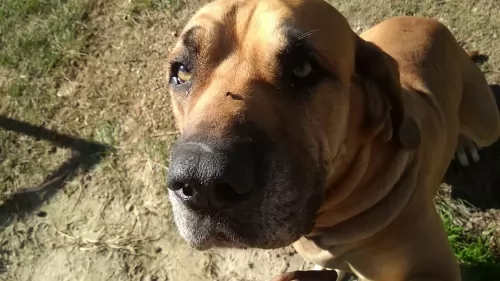 The Cabecudo Boiadeiro has always played an important role in the management of livestock. Stockdogs like this were known in parts of Minas Gerais as early as the 18th century. In fact reports tell us that the Cabecudo has existed since the 16th century as a working dog in the rural parts of Brazil.
The Cabecudo Boiadeiro has always played an important role in the management of livestock. Stockdogs like this were known in parts of Minas Gerais as early as the 18th century. In fact reports tell us that the Cabecudo has existed since the 16th century as a working dog in the rural parts of Brazil.
The Capecudo has remained much the same over the centuries – a dog created as a guardian for large properties, as a game hunter and livestock herder and protector. Today this Molosser dog still drives cattle in Brazil.
 This large breed dog is also known as the Mee Kyun Dosa. In spite of his huge size, he isn’t aggressive at all and is bred to be a companion dog.
This large breed dog is also known as the Mee Kyun Dosa. In spite of his huge size, he isn’t aggressive at all and is bred to be a companion dog.
He was originally developed to be a working dog. The dog was developed in the late 1800’s from European and Asian working breeds. Those interested in dog breeds suspected that a crossing of the Japanese Tosa-Inu with the Neapolitan Mastiff and the Dogue de Bordeaux brought about the breed. They also thought that the Saint Bernard and English Mastiff were brought in later on as well.
These large molosser dogs have been developed through years of inbreeding. It is one of the biggest dogs in Korea.
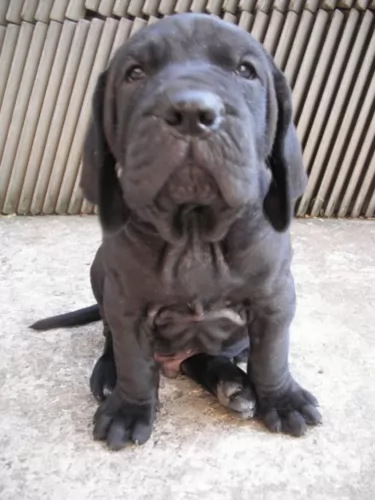 The Brazilian Cabedudo is a strong boned, large dog with a large head and a deep chest. The coat of the dog is short and dense and in wheat-colored shades or fawn shades, while brindle is also in existence. The Cabeçudo Boiadeiro is also known as the Brazilian Mastiff and is a large, imposing dog.
The Brazilian Cabedudo is a strong boned, large dog with a large head and a deep chest. The coat of the dog is short and dense and in wheat-colored shades or fawn shades, while brindle is also in existence. The Cabeçudo Boiadeiro is also known as the Brazilian Mastiff and is a large, imposing dog.
Because the breed was created from a blend of the English Mastiff, the Bulldog and the Bloodhound, not only is this a large dog in height, but a big boned dog as well. He has short to medium length floppy ears and a long tail.
The Brazilian Cabedudo is a courageous dog. When he has been properly trained and socialized, this large dog is capable of becoming an obedient, loving and devoted family pet who is able to get along with children and other pets too. He reserves this gentler side of him for his human family and won’t easily tolerate strangers.
 You can’t help but stare at the Korean Mastiff because of his strong, muscular neck of loose skin that forms dewlaps. His face is wrinkled and he has a cumbersome, sluggish gait.
You can’t help but stare at the Korean Mastiff because of his strong, muscular neck of loose skin that forms dewlaps. His face is wrinkled and he has a cumbersome, sluggish gait.
He is a large dog standing at anything between 59 to 76cm in height, both male and female. He can weigh between 65 to 74kg. He is noticeable because of his fairly loose fitting coat, which is short and smooth and which is a rich, shiny reddish, orange or brown colour.
The nose of the dog is broad and dark, the ears soft and floppy and he has eyes which are set wide apart.
The Korean Mastiff is reserved with strangers but he is friendly and even tempered with his human family, making an ideal pet.
He is looked upon as a gentle giant, being an oversized playmate for children and he also tolerates other pets in the home.
He isn't an overly energetic dog, but that doesn't mean he shouldn't be exercised. He will need long walks to avoid him putting on weight.
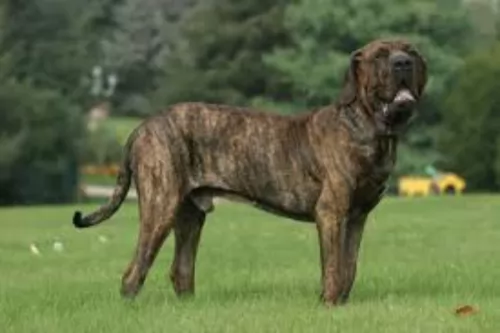 Deciding to become an owner of a dog is a big responsibility, as you are going to have your pet with you for 10 – 15 years at least. There are so many essentials to remember with owning a dog and most dogs are far happier and healthier when allowed to live part of the time indoors with their human family.
Deciding to become an owner of a dog is a big responsibility, as you are going to have your pet with you for 10 – 15 years at least. There are so many essentials to remember with owning a dog and most dogs are far happier and healthier when allowed to live part of the time indoors with their human family.
It's not always easy being a large dog such as the Cabecudo Boiadeiro, as people often assume these mastiff-type dogs are unfriendly and aggressive.
Every dog breed however, is essentially the product of his owners lifestyle and his unique upbringing with them. When this large pet is properly trained and socialized and he is loved and well cared for, he promises to be faithful, devoted, playful and loving – a real friend and protector.
 Your huge Korean Mastiff is a good natured dog who isn’t aggressive. He loves being with his human family and makes a particularly good pet when he has been trained and socialized.
Your huge Korean Mastiff is a good natured dog who isn’t aggressive. He loves being with his human family and makes a particularly good pet when he has been trained and socialized.
He likes a firm but fair owner who takes a leader-of-the-pack role. In spite of his largeness and sluggishness, he can be quite agile and makes a good watchdog too.
All round, the Korean Mastiff, known as a gentle giant, is capable of making you a splendidly friendly, loving canine companion.
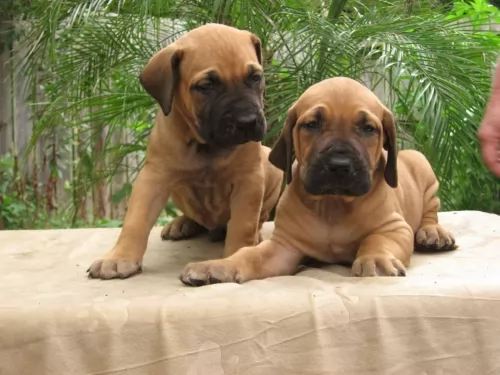 The Cabecudo Boiadeiro is considered a robust breed, used to lots of exercise while herding livestock. With good care and plenty of exercise he can live to 10, 11 or 12 years of age. He is a large breed and this fact alone will ensure that you be aware of some dog illnesses prone to larger breeds.
The Cabecudo Boiadeiro is considered a robust breed, used to lots of exercise while herding livestock. With good care and plenty of exercise he can live to 10, 11 or 12 years of age. He is a large breed and this fact alone will ensure that you be aware of some dog illnesses prone to larger breeds.
This is an orthopedic condition where the hip joints don’t fit properly into the hip joint. Larger breeds such as the Cabecudo Boiadeiro are at a higher risk of getting this orthopaedic disorder.
You’ll see your dog battling to move around and he may not even be able to get up again after lying down. Sometimes a dog might even require surgery. Thankfully, there is testing for hip dysplasia in dogs, and you can ask to see a clearance certificate if you buy your puppy from a so-called reputable breeder.
Progressive retinal atrophy (PRA) is a degenerative eye disorder that can actually lead to blindness in your pet. Night blindness sets in and your dog becomes unsure how to walk in unfamiliar areas, You'll notice that his eyes become gray or cloudy-looking as though there is a film over the eyes. Parent dogs with this eye disease should be spayed or neutered.
 Treat your big Mastiff dog like the wonderful fur-child he is and make sure your attend to all his medical needs to avoid pain and discomfort for him.
Treat your big Mastiff dog like the wonderful fur-child he is and make sure your attend to all his medical needs to avoid pain and discomfort for him.
Cherry eye is a fairly common health issue with this breed. It affects the tear gland of the third eyelid, and if left untreated, can lead to ongoing eye problems.
All dogs have a third eyelid, as well as two tear producing glands to lubricate the eyes. Its an important protective component to eye health in dogs. When the connective tissue that holds the gland in place is damaged or weak, there is a red protrusion of the gland from the lower eye. This is a congenital disorder. Don’t ignore it, but get your pet to the vet so you can catch it early.
Canine bloat, known as gastric dilatation and volvulus can be a killer disease for your pet, more so with deep-chested, large breeds.
Gas accumulation is known as bloat, and its the accumulation of gas which can cause the stomach to rotate. A dog can go into shock from bloat. The reason for this is that the stomach expands, putting pressure on veins. Blood can’t flow as it should and the blood supply gets cut off to the stomach.
Your dog could be vomiting, restless, the stomach hard and bloated or he may be drooling. Dogs who gobble their food down and eat just one large meal a day have an increased susceptibility to GDV than other dogs.
The wrong ingredients of a dog’s diet can also contribute to bloat. High quality food and feeding your pet smaller meals can help.
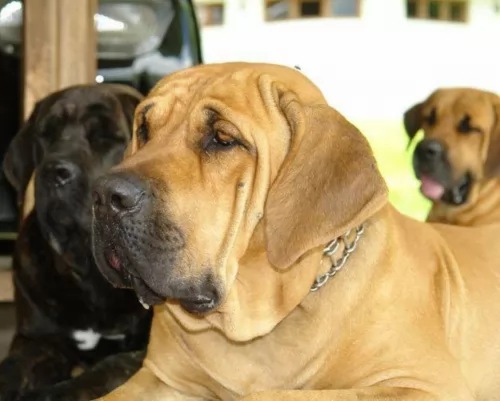 The Cabecudo Boiadeiro is a large breed dog. In spite of his size though, he is surprisingly an active dog. He will need regular exercise such as a brisk walk very day. You can also put aside time to give him some exciting ball games. He is a breed used to working so he will be most unhappy lying around doing nothing.
The Cabecudo Boiadeiro is a large breed dog. In spite of his size though, he is surprisingly an active dog. He will need regular exercise such as a brisk walk very day. You can also put aside time to give him some exciting ball games. He is a breed used to working so he will be most unhappy lying around doing nothing.
If you are going to be feeding your Cabecudo Boiadeiro commercially manufactured good, make sure it is the best quality food. Always go for dog foods which have all the nutrients your large dog requires.
You get wet, dry and raw complete foods and you can give your pet a mix of these. Always make sure that your pet gets some raw meat in from time to time too, otherwise he could battle with skin diseases.
If you aren’t sure how to feed such a large dog, your veterinarian will help you decide which category of food would suit your pet. Clean, cool water is to be provided constantly.
 A Korean Mastiff is an easy dog to groom with his short smooth coat. He is a moderate shedder so a brush twice a week will be sufficient to maintain the shiny, smooth condition of his coat.
A Korean Mastiff is an easy dog to groom with his short smooth coat. He is a moderate shedder so a brush twice a week will be sufficient to maintain the shiny, smooth condition of his coat.
Because the dog has lots of skin and folds, these folds will need to be washed and kept clean as grime can collect.
While you're busy attending to his skin check his nails too and check inside and outside his ears for signs of redness and irritation.
Puppies use up more energy than mature adults, requiring a diet of good quality protein. Dogs that have been spayed or neutered will require less calories as will senior dogs.
Korean Mastiffs require high quality nutrition, and if its dry kibble, make sure its the best brand. Mix in some home-made food such as cooked chicken, brown rice and vegetables from time to time as well as some raw meat occasionally.
Protein and fat from good sources are top ingredients for your Korean Mastiff. Avoid food with allergens such as corn and wheat, sweeteners, preservatives and colorants.
Make sure your large pet has constant access to fresh water.